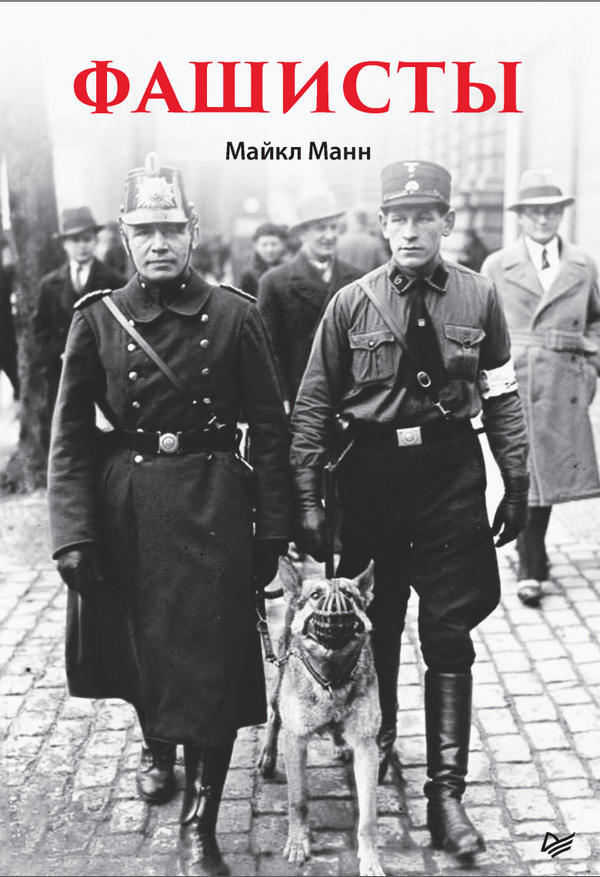Читать книгу - "Фашисты - Майкл Манн"
Аннотация к книге "Фашисты - Майкл Манн", которую можно читать онлайн бесплатно без регистрации
Как вышло так, что самые обычные и добропорядочные люди вдруг оказались фанатичными сторонниками идей фашизма? По каким причинам с начала двадцатых годов прошлого века фашизм набирал в Европе все большую и большую популярность? Видный американский социолог и историк Майкл Манн дает на эти вопросы свои ответы — обескураживающие, шокирующие, но весьма убедительные.
Kitchen, M. 1976. Fascism. London: Macmillan.
Kluge, U. 1984. Der Österreichische Ständestaat 1934–1938. Vienna:
Knight, M. 1952. The German Executive 1890–1933. Stanford, Calif.: Stanford University Press.
Knox, M. 1996. “Expansionist zeal, fighting power and staying power in the Italian and German dictatorships.” In Bessel (ed.), Fascist Italy and Nazi Germany.
Kofas, J. 1983. Authoritarianism in Greece: The Melaxas Regime. New York: Columbia University Press.
Kolb, E. 1979. “Zur Sozialbiographie einer Fuhrungsgruppe der SPD am Anfang der Weimarer Republik.” In Herkunft und Mandat: Beitrage zur Fohrungsproblematik in der Arbeiterbewegung. Frankfurt and Cologne: Europaische Verlagsanstalt.
Konrad, H. 1989. “Social democracy’s drift toward nazism before 1938.” In Parkinson (ed.), Conquering the Past.
Koshar, R. 1986. Social Life, Local Politics, and Nazism. Marburg, 1880–1935. Chapel Hill: University of North Carolina Press.
Kovács, M. 1991 “The ideology of illiberalism in the professions: Leftist and rightist radicalism among Hungarian doctors, lawyers and engineers, 1918-45.” European History Quarterly 21.
Kratzenberg, V. 1989. Arbeiter auf dem Weg zu Hitler? Frankfurt/Main: Peter Lang.
Kuhr, H. 1973. Partien und Wahlen im Stadt- und Landkreis Essen in der Zeit der Weimarer Republik. Düsseldorf: Droste.
Lackó, M. 1969. Arrow-Cross Men, National Socialists. 1935–1944. Budapest: Akademiai Kiado.
Lannon, F. 1984. “The church’s crusade against the republic.” In P. Preston (ed.), Revolution and War in Spain. London: Methuen.
_____. 1987. Privilegio, persecution y profetía: La iglesia católica en Espana. 1875–1975. Madrid: Alianza.
Laqueur, W. (ed.) 1976. Fascism: A Reader’s Guide. Berkeley: University of California Press.
Larsen, S. U. 1998. “Overcoming the past when shaping the future.” In Larsen and Hagtvet, Modern Europe after Fascism.
_____. 2001. “Was there Fascism outside Europe? Diffusion from Europe and domestic impulses.” In Larsen (ed.), Fascism outside Europe.
Larsen, S. U. (ed.). 2001. Fascism outside Europe. New York: Columbia University Press.
Larsen, S. U., and B. Hagtvet (eds.). 1998. Modern Europe after Fascism 19431980s. New York: Columbia University Press.
Larsen, S., et al. (eds.). 1980. Who Were the Fascists? Social Roots of European Fascism. Oslo: Universitetsforlaget.
Ledeen M. 1977. The First Duce: D’Annunzio at Fiume. Baltimore, Md.: Johns Hopkins University Press.
_____. 1989. “The evolution of Italian fascist anti-semitism.” In Marrus (ed.), The Nazi Holocaust, vol. 4.
Lee, S. 1987. The European Dictatorships, 1918–1945. London: Methuen.
Lewis, J. 1991. Fascism and the Working Class in Austria, 1918-34. Oxford: Berg. Liebe, W. 1956. Die Deutschnationale Volkspartei, 1918–1924. Dusseldorf: Droste. Lindstrom, U. 1985. Fascism in Scandinavia, 1920–1940. Stockholm: Almquist & Wiksell.
Linz, J. 1976. “Some notes toward a comparative study of fascism in sociological historical perspective.” In W. Laqueur (ed.), Fascisim: A Reader’s Guide. Berkeley: University of California Press.
_____. 1978. “From great hopes to civil war: The breakdown of democracy in Spain.” In Linz and A. Stepan (eds.), The Breakdown of Democratic Regimes: Europe. Baltimore, Md.: Johns Hopkins University Press.
_____. 1980. “Political space and fascism as a late-comer.” In S. U. Larsen et al. (eds.), Who Were the Fascists? Bergen: Universitetsforlaget.
_____. 1998. “Fascism is dead. What legacy did it leave?” In Larsen and Hagtvet (eds.), Modern Europe after Fascism.
Lipset, S. M. 1963. Political Man. London: Heinemann.
Luebbert, G. 1991. Liberalism, Fascism or Social Democracy: Social Classes and the Political Origins of Regimes in Interwar Europe. New York: Oxford University Press.
Livezeanu, I. 1990. “Fascists and conservatives in Romania: Two generations of nationalists.” In M. Blinkhorn (ed.), Fascists and Conservatives. London: Unwin Hyman.
_____. 1995. Cultural Politics in Greater Romania. Ithaca, N.Y.: Cornell University Press.
Loewenberg, P. 1983. “The psychohistorical origins of the Nazi youth cohort.” In Loewenberg, Decoding the Past. New York: Knopf.
_____. 1985. “Otto Bauer as an ambivalent party leader.” In Rabinbach (ed.), The Austrian Social Experiment.
Lösche, P. 1992. Die SPD: Klassenpartei — Volkspartei — Quotenpartei. Darmstadt: Wiss. Buchges.
Lyttleton, A. 1982. “Fascism and violence in post-war Italy: Political strategy and social conflict.” In Mommsen and Hirschfeld (eds.), Social Protest, Violence and Terror.
_____. 1987. The Seizure of Power: Fascism in Italy, 1919–1929. London: Weidenfeld & Nicolson.
_____. 1996. “The ‘crisis of bourgeois society’ and the origins of Fascism.” In Bessel (ed.), Fascist Italy and Nazi Germany.
Macarro Vera, J. M. 1989. “Social and economic policies of the Spanish left in theory and in practice.” In Alexander and Graham (eds.), French and Spanish Popular Fronts.
Madden, P. 1982a. “Generational aspects of National Socialism, 19191933.” Social Science Quarterly 63.
_____. 1982b. “Some social characteristics of early Nazi Party members, 1919-23.” Central European History 15.
Maddison, A. 1982. Phases of Capitalist Development. Oxford: Oxford University Press.
Maier, C. 1975. Recasting Bourgeois Europe. Princeton, N.J.: Princeton University Press.
Malefakis, E. 1970. Agrarian Reform and Peasant Revolution in Spain. New Haven, Conn.: Yale University Press.
Mallett, R. 2000. The Italian Navy and Fascist Expansionism, 1935–1940. London: Frank Cass.
Manjón, O. 1976. El partido republicano radical 1908–1936. Madrid: Tebas.
Mann, M. 1986. The Sources of Social Power, vol. 1: A History from the Beginning to 1760 AD. New York: Cambridge University Press.
_____. 1988. “The autonomous power of the state: Its origins, mechanisms and results.” In M. Mann (ed.), States, War and Capitalism. New York: Basil Blackwell.
_____. 1993. The Sources of Social Power, vol. 2: The Rise of Classes and NationStates, 1760–1914. New York: Cambridge University Press.
_____. 1995. “Sources of variation in working-class movements in twentiethcentury Europe.” New Left Review, no. 212.
_____. 1997. “The contradictions of continuous revolution.” In I. Kershaw and M. Lewin (eds.), Stalinism and Nazism: Dictatorship in Comparison. Cambridge: Cambridge University Press.
_____. 2003. Incoherent Empire. London: Verso.
Manoilescu, M. 1937. Le Parti Unique, 2nd ed. Paris: Alcan.
_____. 1938. Le Siècle du corporatisme: Doctrine du corporatisme integral et pur, 2nd ed. Paris: Alcan.
Maravall, J. M. 1997. Regimes, Politics, and Markets: Democratization and Economic Change in Southern and Eastern Europe. Oxford: Oxford University Press.
Marco, J. M. 1988. La inteligencia republicana: Manuel Azana 1897–1930. Madrid: Biblioteca Nueva.
Marcuse, P. 1985. “The housing policy of social democracy: Determinants and consequences.” In Rabinbach (ed.), Austrian Socialist Experiment.
Marshall, B. 1988. “Politics in academe: Gottingen University and the growing
Прочитали книгу? Предлагаем вам поделится своим впечатлением! Ваш отзыв будет полезен читателям, которые еще только собираются познакомиться с произведением.
Оставить комментарий
-
 Илья12 январь 15:30
Книга прекрасная особенно потому что Ее дали в полном виде а не в отрывке
Горький пепел - Ирина Котова
Илья12 январь 15:30
Книга прекрасная особенно потому что Ее дали в полном виде а не в отрывке
Горький пепел - Ирина Котова
-
 Гость Алексей04 январь 19:45
По фрагменту нечего комментировать.
Бригадный генерал. Плацдарм для одиночки - Макс Глебов
Гость Алексей04 январь 19:45
По фрагменту нечего комментировать.
Бригадный генерал. Плацдарм для одиночки - Макс Глебов
-
 Гость галина01 январь 18:22
Очень интересная книга. Читаю с удовольствием, не отрываясь. Спасибо! А где продолжение? Интересно же знать, а что дальше?
Чужой мир 3. Игры с хищниками - Альбер Торш
Гость галина01 январь 18:22
Очень интересная книга. Читаю с удовольствием, не отрываясь. Спасибо! А где продолжение? Интересно же знать, а что дальше?
Чужой мир 3. Игры с хищниками - Альбер Торш
-
 Олена кам22 декабрь 06:54
Слушаю по порядку эту серию книг про Дашу Васильеву. Мне очень нравится. Но вот уже третий день захожу, нажимаю на треугольник и ничего не происходит. Не включается
Донцова Дарья - Дантисты тоже плачут
Олена кам22 декабрь 06:54
Слушаю по порядку эту серию книг про Дашу Васильеву. Мне очень нравится. Но вот уже третий день захожу, нажимаю на треугольник и ничего не происходит. Не включается
Донцова Дарья - Дантисты тоже плачут





